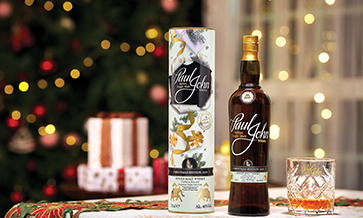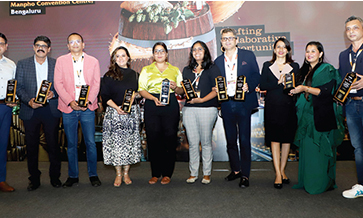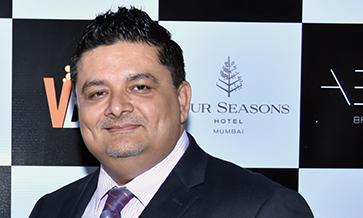Brews&Spirits caught up with seven of India’s best marketers across various categories: Vikram Damodaran of Diageo India, Anand Virmani of Nao Spirits, Ashok Chokalingam of Amrut Distilleries, Heemanshu Ashar of John Distilleries, Shalini Sharma of Picadilly Distilleries, Kimberley Perreira of Maya Pistola, and Varun Jain of Smoke Lab Vodka. Here’s what they had to say:
What motivates your company to enter international beverage alcohol competitions? How do you measure the value of winning medals and high rankings?
Ashok: At Amrut Distilleries, participating in international beverage alcohol competitions allows us to showcase the craftsmanship behind our products and position ourselves among the world’s finest spirits.
Heemanshu: Entering international competitions helps showcase John Distilleries’ craftsmanship on a global stage, especially in a rapidly growing category like Indian single malts.
Vikram: Participating in international competitions allows us to showcase Godawan Artisanal single malt and engage with industry leaders, redefining whiskey perceptions. Winning medals helps educate consumers and highlights our brand’s heritage on a global scale.
Shalini: Entering international beverage alcohol competitions boosts brand credibility, sets Picadilly’s products apart in a crowded market, and validates quality through expert recognition.
Anand: The value of a positive result is not just important for the final consumer to see; it ideally creates happy ripples all through the supply chain. It strengthens the belief of the internal sales and marketing teams and spurs them on.
Kimberley: As a new-age, non-Mexican agave spirit born in India, our focus on awards is two-fold: to spread the word internationally about new-age, authentic agave spirits, and to build credibility for non-Mexican agave spirits to stand at par with traditional Mexican spirits.
Varun: Our motivation comes from a desire to showcase the quality and innovation we bring from India, which isn’t traditionally known for premium spirits. Competing internationally allows us to demonstrate that we can not only compete with the best but also offer something truly unique.
Can you describe the process you go through when preparing your submissions for these international competitions?
Ashok: It begins with selecting the right expressions, focusing on those that embody the craftsmanship, innovation and quality that define our brand. We carefully review the competition categories and guidelines to match each product to the appropriate category. We conduct internal tastings with our master blender and team to finalise the specific batches for submission, ensuring consistency and peak quality.
Heemanshu: We have an internal ranking system of awards evaluation in terms of the country, our presence in that market, the year they began, their reputation in the country and the world, media reach, and consumer reach. We also take external points of view from our distributors and retailers on which awards they value.
Vikram: We choose competitions with diverse juries, including master blenders and experienced tasters, to effectively promote Indian single malts. Our goal is to validate our commitment to ‘Craft for Good’ while showcasing India’s uniqueness in the global beverage market.
Shalini: After assessing the parameters of judging the liquid, we make careful selections of our whisky or rum expressions to enter the competition. The samples are then submitted along with details about the product.
Anand: We shortlist a few competitions every year to submit our brands to. This is done based on markets we are present in and what they might value. The IWSC and the San Francisco Awards, for example, have global appeal while the American Distilling Institute awards are more relevant to the US market.
Kimberley: While submitting the liquid is one part of the submission process, what goes alongside it is narrating the story of Maya Pistola: the concept behind creating each variant, our innovative ageing methodologies, and highlighting the use of 100% pure agave spirit from the Deccan Plateau.
Varun: We focus on a few key competitions that align with our brand values, such as the San Francisco Spirits Competition, rather than entering every available option.
What impact do these medals/ rankings have on your brand’s reputation and sales, both short-term and long-term?
Kimberley: Our 36 medals and awards to date have played a role in increasing recall for Maya Pistola in India. They have helped us expand into three international markets: USA, Singapore and Thailand.
Heemanshu: In the long term, we build sustained brand equity by positioning Paul John Indian single malts and John Distillery’s portfolio of spirits and wines among the top-quality players globally. It enhances our standing with key partners, including tourism stakeholders for our visitor centre in Goa.
Vikram: Awards build credibility over time, which is vital for long-term reputation. For Godawan, recognised as ‘Best Indian Single Malt’ twice in 2024, consistency in impressing discerning palates is more important than individual accolades.
Ashok: Consistent wins across competitions establish our brand as a leader in quality and innovation, reinforcing customer loyalty. This sustained recognition also enhances relationships with distributors and partners, leading to more stable demand and market expansion opportunities.
Anand: We can measure short-term sales. The impact has a lot to do with the kind of competition we win and how much we speak about it through our PR and media channels.
Varun: The long-term impact is more significant. When people see our products consistently recognised, it reassures them of the quality, which encourages repeat purchases and loyalty. This trust, coupled with organic word-of-mouth, is vital for our brand’s sustained success in the market.
Shalini: Medals and rankings from international competitions have a significant impact on our brand’s reputation and sales, both immediately and in the long term. In the short term, prestigious awards drive an instant surge in sales, as consumers are drawn to products recognised for their quality.
Have you noticed any trends in consumer preferences that have influenced your product development in response to feedback from competitions?
Ashok: One prominent trend is the growing demand for unique and authentic experiences, which has encouraged us to experiment with indigenous ingredients, special cask finishes, and limited-edition releases. We’ve also noticed an increasing preference for transparency in production, prompting us to highlight aspects like age statements, single-origin ingredients, and sustainable practices in our offerings.
Heemanshu: Competitions have highlighted a rising interest in whiskies with unique cask finishes, such as sherry or wine barrels, and limited releases. Consumers and judges alike are also paying more attention to eco-friendly practices, prompting us to explore sustainable packaging and production methods.
Vikram: We aim to create distinctive products that appeal to diverse tastes. Our expressions, like Godawan 01 (Rich & Rounded) and Godawan 02 (Fruit & Spice), cater to a wider audience, and the positive feedback reinforces our commitment to providing an exceptional brand experience.
Varun: Our primary focus is on introducing distinct flavours that showcase the diversity of Indian botanicals, which we believe is where we stand out. Vodka flavours such as aniseed, saffron, and our upcoming green chilli mango are designed to appeal to both Indian and international palates.
Kimberley: One point of feedback is the growing demand for aged variants and mature flavour profiles to introduce more nuanced flavours. This trend drove us to launch our Añejo and Extra Añejo this year.
Shalini: Yes, one significant trend we have observed is the growing demand for premium, craft-style spirits with unique flavour profiles, which has driven us to experiment with innovative aging techniques, cask finishes, and blends.
Anand: We generally try and keep our product development independent of competition feedback; but in the past I have referred to feedback for reinforcing some of the things we hear directly from customers.














